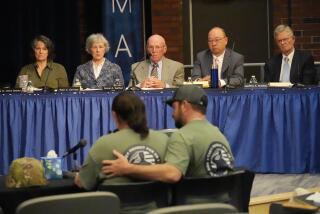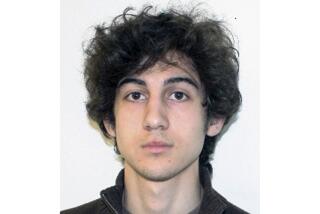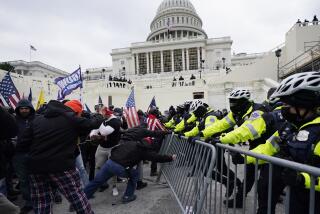Report faults FBI work before Boston Marathon attack
WASHINGTON — An inspectors general report released Thursday faulted the FBI for failing to conduct a “more thorough assessment” of suspected Boston Marathon bomber Tamerlan Tsarnaev, saying such an investigation might have turned up evidence about his growing embrace of Islamic militancy and his possible threat to the United States.
But the report’s unclassified summary stopped short of saying a closer examination of Tsarnaev would necessarily have prevented the April 15, 2013, attack, which killed three people and injured more than 260.
Acting on a 2011 tip from Russian intelligence, the FBI investigated Tsarnaev before last year’s bombing, but closed the inquiry after the bureau found no links to terrorism.
Tsarnaev was killed four days after the attack in a shootout with police in nearby Watertown, Mass. His younger brother and suspected accomplice, Dzhokhar Tsarnaev, was arrested and faces a potential death sentence when he goes on trial this year.
The joint report by the inspectors general from the departments of Justice and Homeland Security and various intelligence agencies said that after Tsarnaev returned to the U.S. from a trip to Russia’s North Caucasus region in 2012, the FBI was unaware that he had visited a training ground for extremists.
Had the FBI known about his activities there or about his Internet postings embracing Islamist militancy, the report said, “the FBI would have opened a second assessment and interviewed Tsarnaev about why he went to Russia.”
The report also criticized the FBI for not sharing its intelligence on Tsarnaev with law enforcement officials in Boston, saying that local police might have opened their own investigation.
After the bombing, the FBI was sharply criticized for not doing more to investigate Tsarnaev. The inspectors general report said that in March 2011 the FBI’s legal attache in Moscow received a memo from the Russian security agency FSB regarding Tsarnaev and his mother. It alleged that both were “adherents of radical Islam” and that Tamerlan Tsarnaev was preparing to travel to Russia to join “unspecified bandit underground groups” in the restive republics of Dagestan and Chechnya.
The Russian agency also advised that Tsarnaev was considering changing his name to “Tsarni.” The memo included incorrect birth dates for Tsarnaev and misspelled his last name.
The attache forwarded the memo to the Boston FBI field office, where an agent assigned to the local Joint Terrorism Task Force began investigating. She conducted database searches, reviewed references to Tsarnaev and his family, performed drive-bys of Tsarnaev’s home, visited his former college and interviewed Tsarnaev and his parents.
But the inspectors general report faulted the FBI for not doing more, saying that “additional investigative steps would have resulted in a more thorough assessment,” perhaps revealing Tsarnaev’s upcoming trip to the Russian Caucasus.
The report said that the FBI should have alerted local police, tapped into more databases, visited the mosque where Tsarnaev often erupted in tirades about extremism, interviewed Tsarnaev’s wife and talked to his former girlfriend, whom he was accused of assaulting in 2009, resulting in arrest. They also should have interviewed Tsarnaev’s friends and associates, the report said.
Furthermore, the report said, the FBI agent who interviewed Tsarnaev and his parents did not attempt to elicit information about his travel plans, his lifestyle changes or “his sympathy for militant separatists in Chechnya and Dagestan.”
FBI Director James B. Comey, who took the helm after the Boston Marathon bombings, said in response to the report’s findings that the bureau had taken broad steps to ensure that in the future “all threat information is proactively and uniformly shared with state and local partners.”
He strongly defended the work of the FBI in the worst terrorism attack in the U.S. since Sept. 11, 2001.
“I am proud of the work that the Boston field office did in this case, before the bombings as well as after them,” Comey said.
More to Read
Sign up for Essential California
The most important California stories and recommendations in your inbox every morning.
You may occasionally receive promotional content from the Los Angeles Times.











